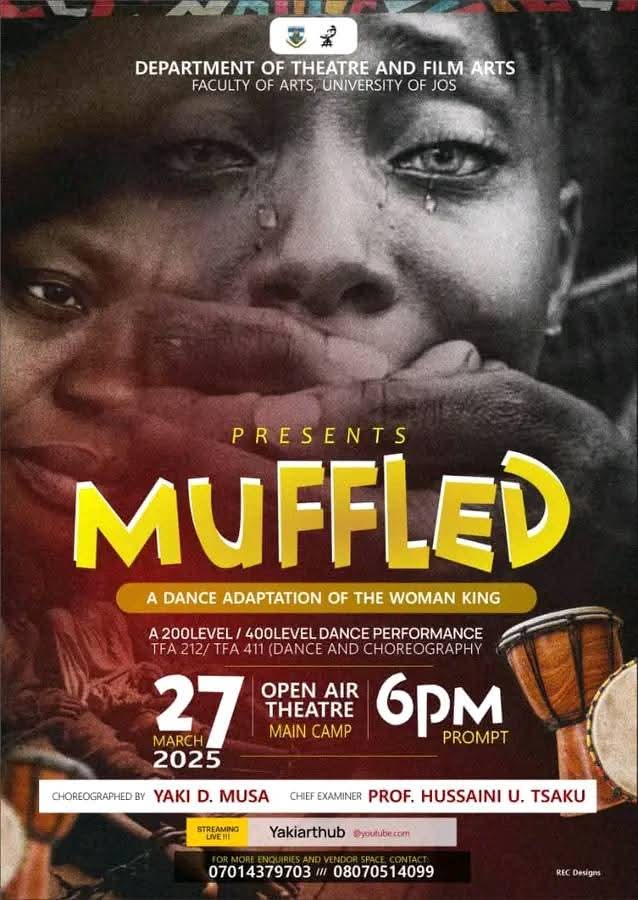D.M LONGGUL red Pen…………………….
In the vibrant world of performance, Yaki Musa, a dynamic choreographer and esteemed scholar at the prestigious University of Jos’s theatre and film arts department, will be joining forces with his talented 400 and 200 level students to unveil a captivating Dance drama titled ‘Muffled’ today, Thursday, 27th of 2025, by 6 pm at the enchanting open-air theatre nestled within the heart of central Nigeria.
This compelling Dance drama draws its inspiration from the unfolding narrative between Nigeria’s Senate President Godwill Akpabio and the distinguished Senator Natasha Udaguan. With its creative roots intertwined with a dramatic reinterpretation of the ‘Woman King’ and the fierce Agojie female warriors, the visionary Director/Choreographer and his socially aware students are poised to deliver a striking commentary on the ongoing national political theater of gender dynamics, intimidation, systemic oppression, and the relentless pursuit of truth and justice within Nigeria’s troubled assembly. What invaluable lessons might the Nigerian woman glean from the legendary Agojie warriors of the ancient kingdom of Dahomey? Can the indomitable Senator Natasha, a radical yet solitary voice, triumph in this battle on the stage dominated by men? This is a narrative you certainly won’t want to overlook in this audacious theatrical experience.
Recall that, In February 2025, Nigerian Senator Natasha Akpoti-Uduaghan accused Senate President Godswill Akpabio of sexual harassment, alleging inappropriate advances both within and outside the Senate chambers. Following these allegations, the Senate’s Ethics Committee dismissed her petition on procedural grounds, stating it was “dead on arrival” because she had signed it herself. Subsequently, on March 6, 2025, the Senate suspended Akpoti-Uduaghan for six months, citing misconduct unrelated to her allegations, including refusing to sit in her assigned seat, speaking without recognition, and making abusive remarks against Senate leadership. This suspension has ignited protests and debates about gender inequality in Nigerian politics, with women’s rights groups condemning the action and organizing demonstrations under the banner “We are all Natasha.” Akpoti-Uduaghan has taken her case to international forums, seeking intervention and highlighting the challenges women face in Nigerian politics.
Senator Natasha Akpoti-Uduaghan’s political journey in Nigeria vividly showcases the hurdles encountered by women striving for leadership within a male-centric landscape. Her battle against political oppression is not simply a solitary endeavor but a crucial element of the expansive quest for women’s empowerment. To grasp why her triumph can only unfold through a unified movement of Nigerian women, the Theatre Director draws a striking analogy with the Agojie warriors, as illustrated in The Woman King—an all-female military unit from the Kingdom of Dahomey (now Benin), whose power stemmed from their solidarity, fortitude, and rebellion against patriarchal norms.
Portrayed on stage with artistic brilliance, the Agojie warriors were not mere individuals; they flourished as a formidable entity due to their shared resistance against external subjugation and internal frameworks that aimed to curtail their strength. In a similar spirit, could it be that the Theatre Director is suggesting that Natasha Akpoti-Uduaghan’s struggle symbolizes a more significant concern—one that necessitates Nigerian women to rise not as solitary combatants but as a cohesive force? Just as the Agojie trained and uplifted each other, Nigerian women must galvanize, advocate, and devise strategic plans because your political insignificance has only just begun, and the loud exchanges of insults between Sen. Nwaebonyi and Oby Ezekwesili within the Senate reveal how men dismiss the concerns of Nigerian women. The Agojie warriors thrived in an era when women were relegated to the shadows, yet they fought fiercely to carve out their own influence. Natasha’s fight is a contemporary continuation of this legacy, confronting patriarchal conventions that aim to marginalize women from positions of authority. However, her success transcends personal aspirations—it serves as a gauge of whether Nigerian women can collectively demand representation and reclaim their rightful space in governance.
In The Woman King, the Agojie warriors engaged in more than mere battles; they resisted colonial encroachment, internal treachery, and societal norms that undermined their power. In much the same way, Natasha Akpoti-Uduaghan contends with recall efforts and political sidelining, a form of violence designed to mute her voice. Like the Agojie, her staged struggle is not solely about survival but about reconfiguring the system. Yet, for this metamorphosis to materialize, Nigerian women must forge a political movement that transcends party affiliations and unites them in the quest for gender equity.
For today, it’s about the stage at the University of Jos—only an hour left before we return to the realm of reality. Why not join us in this revolutionary political dance drama? See you there!
Comarade Dakwom Makpring Long’gul
is a Theatre critic and a social commentator
he writes from Jos, Plateau State.
count | 444

Recent Comments
Mwanchuel Daniel PamMarch 8, 2024 at 11:06 pm
Bob WayasNovember 6, 2023 at 5:30 am
JosephNovember 5, 2023 at 3:47 am